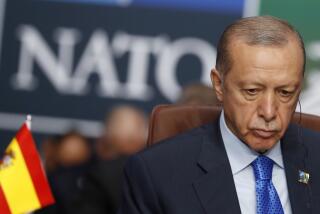Turkey Curtails Military’s Political Power
- Share via
ANKARA, Turkey — The Turkish parliament took another step in this country’s quest to join the European Union by giving overwhelming approval Wednesday to a landmark package of reforms designed to significantly curtail the political power of the military.
On paper, at least, this represents a remarkable move in a country whose very existence is defined by the army. The modern Turkish republic was forged by military commanders from the ruins of the Ottoman Empire, and the army has steered most major political developments since.
“To be a general here is to be close to God,” said political scientist Hasan Koni of the University of Ankara.
“The generals must be having nightmares.”
But few things are as important to Turks these days as joining the EU.
Membership, Turks reason, brings economic prosperity, better jobs, enhanced democracy and the privilege that comes with being recognized as a solidly Western nation.
Turkey hopes to begin negotiations to enter the EU by the end of next year, but to do so it must bring its human rights and political policies closer in line with European standards.
Military commanders earlier this year registered their unhappiness with the campaign to join the EU and with measures that threatened to erode their time-honored authority.
The military has overthrown the government four times in the last four decades, most recently in 1997, when it pressured a pro-Islamic government out of office.
Today, another pro-Islamic government, under the auspices of the Justice and Development Party elected last fall, is running Turkey. But many analysts said the army is, above all, pragmatic and has recognized how broadly popular the notion of joining the EU is.
“We have passed that threshold of the military blocking” Turkey’s pursuit of EU membership, said Murat Sungar, the Turkish diplomat who oversees his country’s dealings with the EU.
The most significant measure in the reform package approved Wednesday involves the National Security Council, a military-controlled policymaking body that shadows the civilian Cabinet.
Its secretary-general -- normally a four-star general -- is often referred to as a parallel prime minister; his powers equal and sometimes exceed that of civilian ministers.
The reform package strips the National Security Council of executive authority and reduces it to an advisory body.
It also opens up the military budget to greater parliamentary scrutiny.
And it abolishes some laws curtailing freedom of expression and assembly.
Doubts remain among many Turks, and among their potential future European partners, on whether Turkey’s civilian and military leaders will fully adopt the changes. Turkish bureaucrats often find ways to circumvent reforms and maintain the status quo.
“You often find here that it’s give with one hand, take away with another,” a European diplomat said.
While some here dismissed Wednesday’s military reforms as superficial, others thought they marked a point of no return for Turkey’s efforts to democratize, to join the West and to require the generals to account for the billions of dollars they spend annually.
“We have an overstated respect for the military here, and that psychology might play a role. But with this package, the members of parliament will have more courage,” said Emin Sirin, a member of parliament with the ruling party.
“The military is going to have to explain things,” Sirin said. “This is not going to be cosmetic at all.”
More to Read
Sign up for Essential California
The most important California stories and recommendations in your inbox every morning.
You may occasionally receive promotional content from the Los Angeles Times.














